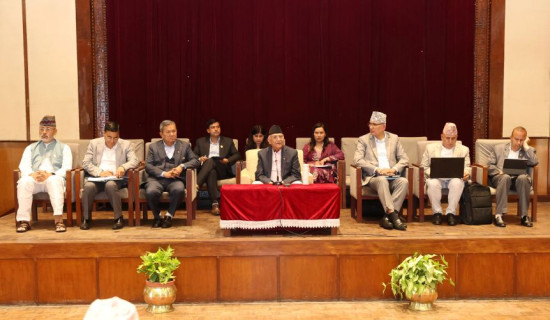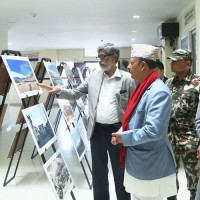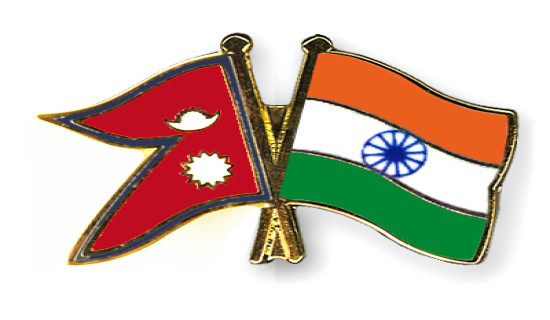- Monday, 2 June 2025
Five ruling parties ink seven-point deal
By A Staff Reporter,Kathmandu, Mar. 13: The five political parties of the present ruling coalition signed a seven-point agreement to tackle the pressing issues and cultivate an environment of good governance, development and social justice.
Nepal Communist Party (UML), Nepal Communist Party (Maoist Centre), Rastriya Swatantra Party, Janata Samajwadi Party-Nepal, and Nepal Communist Party (Unified Socialist) announced a collaborative effort, marking a significant departure from conventional political dynamics in their new agreement.
Earlier on March 4, party chiefs of four ruling political parties inked a similar agreement. However, the CPN (Unified Socialist) had not joined the coalition then and it was signed only by chiefs of four parties—KP Sharma Oli of the CPN-UML, Pushpa Kamal Dahal ‘Prachanda’ of the CPN (Maoist Centre), Rabi Lamichhane of the Rastriya Swatantra Party and Upendra Yadav of JSP-N.
The new joint statement adding the signature of CPN (Unified Socialist) chairman Madhav Kumar Nepal released on Tuesday underscored their shared commitment to prioritising national interests and concerns above individual agendas.
Key highlights of the agreement included the reconstitution of the government under the leadership of Prime Minister and Chairman of CPN (Maoist Centre), Pushpa Kamal Dahal ‘Prachanda’, with the inclusion of the Nepal Communist Party (Unified Socialist). This move signified a concerted effort to consolidate political forces and streamline governance for more effective decision-making.
Additionally, the alliance pledged support for the candidate of CPN (Maoist Centre) for the vacant post of Chairperson of the National Assembly.
Crucially, the agreement emphasised the importance of positive dialogue with other political entities, signalling an inclusive approach to governance. The parties also committed to expediting the transitional justice process and peace-building efforts, essential for maintaining stability and harmony in the country.
The effective implementation of federalism, a cornerstone of Nepal’s governance structure, was another focal point of the alliance’s agenda. By addressing remaining laws related to federal execution, the coalition aimed to ensure equitable development across all regions of the country.
Looking ahead, the parties agreed to draft a common minimum programme, outlining shared objectives and guiding government policies towards addressing economic challenges and promoting national welfare.
Moreover, the alliance remained steadfast in its commitment to safeguarding Nepal’s national independence, sovereignty, and territorial integrity. With a vision for political stability and socialist-oriented economic and social development, the coalition sought to chart a transformative course for the nation.








-square-thumb.jpg)








